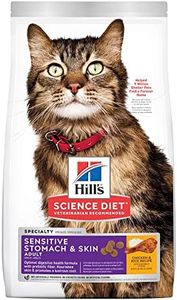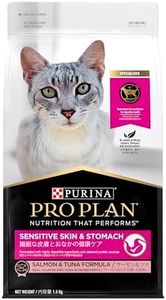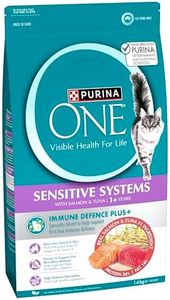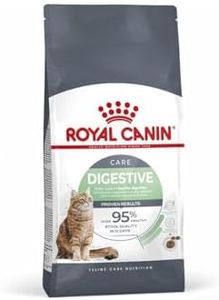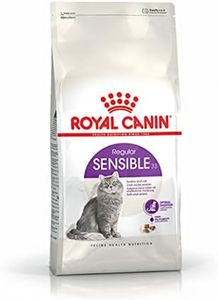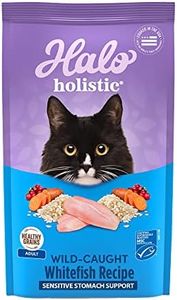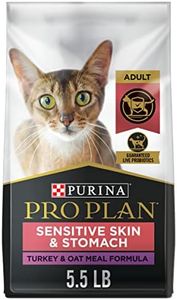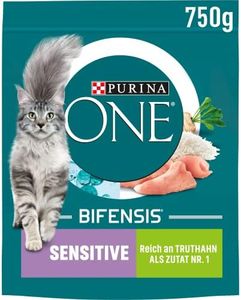We Use CookiesWe use cookies to enhance the security, performance,
functionality and for analytical and promotional activities. By continuing to browse this site you
are agreeing to our privacy policy
9 Best Sensitive Stomach Dry Cat Foods
From leading brands and best sellers available on the web.Buying Guide for the Best Sensitive Stomach Dry Cat Foods
When selecting a dry cat food for cats with sensitive stomachs, the primary goal is to ensure your cat can comfortably digest its food, maintain healthy bowel movements, and avoid common problems like vomiting or diarrhea. Cats with sensitive stomachs often do best with simple, gentle formulas that use easily digestible ingredients, avoid unnecessary additives, and provide balanced nutrition. Consider your cat’s age, activity level, and any specific dietary recommendations from your veterinarian when making your choice.Protein SourceThe protein source is the main ingredient in cat food and is crucial for digestion and overall health. For sensitive stomachs, single, easily digestible animal proteins such as chicken, turkey, or fish tend to be gentler than complex or multiple proteins. If you know your cat is sensitive to a certain type, opt for novel protein sources your cat hasn’t been exposed to before, like duck or venison. Checking the first ingredient can help guide you; simpler is often better for sensitive cats.
Grain-Free vs. Limited Ingredient DietThese terms refer to the formula's content: grain-free foods avoid grains like corn and wheat, while limited ingredient diets use fewer overall ingredients to reduce the chance of triggering stomach upsets. Some cats do better with grain-free options, while others benefit from limited ingredient recipes. If your cat has reactions to specific fillers or grains, trying a grain-free or limited ingredient food can help. However, not all sensitive cats need these specialized diets, so observe your cat’s reaction when transitioning between formulas.
DigestibilityDigestibility determines how easily your cat’s body can break down and use the nutrients in its food. High digestibility reduces the strain on sensitive stomachs and is usually found in foods with quality proteins, minimal fillers, and simple recipes. Look for brands highlighting digestibility or that use gentle cooking processes. If your cat often develops upset stomach from new foods, formulas labeled as highly digestible can help promote better absorption and reduce discomfort.
Added Probiotics and PrebioticsProbiotics are beneficial bacteria, while prebiotics are fibers that feed these bacteria—together, they support your cat’s gut health. For sensitive stomachs, probiotics and prebiotics can help improve digestion and regulate stool consistency. Foods that include these supplements often state so on the packaging. Your cat may benefit from these if you notice frequent stomach issues, irregular stools, or after a course of antibiotics.
Artificial Additives and FillersAdditives such as colors, flavors, and preservatives, as well as fillers like soy or by-products, can sometimes irritate sensitive systems. Cats with digestive issues may do better on diets free from unnecessary additives and fillers. Reading ingredient lists and choosing more natural products can reduce the chance of upset; the shorter and more recognizable the ingredient list, the better it typically is for sensitive felines.
Fiber ContentFiber helps regulate digestion and can prevent both diarrhea and constipation. Too much fiber can cause loose stools, while too little may result in constipation. Sensitive cats usually do best with moderate levels of fiber, often between 2-4%. If your cat has loose stools, a slightly higher fiber may help; if constipated, a lower-fiber formula may be a better fit.
